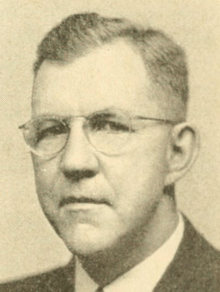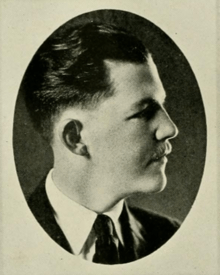Joseph Wilson Ervin
Joseph Wilson Ervin (March 3, 1901 – December 25, 1945) was a member of the United States House of Representatives from North Carolina.
Joseph Wilson Ervin | |
|---|---|
 | |
| Member of the U.S. House of Representatives from North Carolina's 10th district | |
| In office January 3, 1945 – December 25, 1945 | |
| Preceded by | Cameron A. Morrison |
| Succeeded by | Sam Ervin |
| Personal details | |
| Born | March 3, 1901 Morganton, North Carolina |
| Died | December 25, 1945 (aged 44) Washington, D.C. |
| Political party | Democratic |
| Alma mater | University of North Carolina at Chapel Hill |
| Occupation | lawyer |
Family background, education and early professional life
He was the younger brother of a more famous politician, Sam Ervin.

Ervin was born in Morganton, Burke County, North Carolina. He attended the public schools, was graduated from the University of North Carolina at Chapel Hill in 1921 where he was a member of the Dialectic Society and from its law school in 1923, was admitted to the bar in 1923 and commenced practice in Charlotte, North Carolina.
U.S. Congressman
He was elected as a Democrat to the Seventy-ninth Congress and served from January 3, 1945, until his death in Washington, D.C. on December 25, 1945, nearly a year after entering Congress.
Suicide
He committed suicide by inhaling gas from a kitchen stove. This was said to be due to the pain from osteomyelitis that he was suffering from.[1] His brother Sam Ervin was elected to finish his term. Joseph Ervin was interred in Forest Hill Cemetery, Morganton, N.C.
See also
- Sam Ervin
- List of United States Congress members who died in office (1900–49)
External links
- United States Congress. "Joseph Wilson Ervin (id: E000210)". Biographical Directory of the United States Congress.
| U.S. House of Representatives | ||
|---|---|---|
| Preceded by Cameron A. Morrison |
Member of the U.S. House of Representatives from North Carolina's 10th congressional district January 3, 1945 – December 25, 1945 |
Succeeded by Sam Ervin |
Excerpt from the book "Defending White Democracy: The Making of a Segregationist Movement and the Remaking of Racial Politics, 1936-1965″ by Jason Morgan Ward (2011)